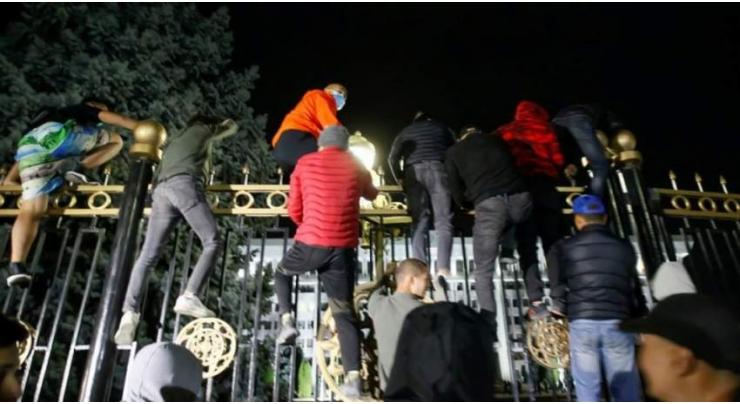
Kyrgyzstan: Two Revolutions, And Other Crises
Faizan Hashmi Published October 07, 2020 | 12:21 AM

Kyrgyzstan, whose prime minister Kubatbek Boronov resigned Tuesday amid a crisis over disputed legislative elections, has over the past 15 years been the scene of several episodes of political turmoil
Paris, (APP - UrduPoint / Pakistan Point News - 6th Oct, 2020 ) :Kyrgyzstan, whose prime minister Kubatbek Boronov resigned Tuesday amid a crisis over disputed legislative elections, has over the past 15 years been the scene of several episodes of political turmoil.
Here is a snapshot: - 2005: The Tulip Revolution - On March 24, 2005, thousands of demonstrators protesting the results of legislative elections and corruption in the regime invaded the government headquarters forcing president Askar Akayev, who had been in power for 15 years, to flee.
The first president after Kyrgyzstan's independence from the Soviet Union, he was given exile in Russia.
The opposition accused Akayev of fixing the elections to ensure the parliament was packed with family members and loyalists, which would ensure his succession.
Protests had started on March 15 when several thousand people demonstrated in towns in the south of the country, notably in opposition stronghold Jalal Abad and Och.
Four months later one of the leaders of the uprising, Kurmanbek Bakiyev, was elected president with 90 percent of the vote.
The term "Tulip Revolution," was used by Akayev himself in a speech warning that no such colour revolution should happen in Kyrgyzstan, as had happened in other ex-Soviet bloc countries.
In 2010, Akayev's successor Bakiyev fled to Belarus after days of bloody street riots that ousted his government and left nearly 100 nearly dead.
On April 7, thousands of demonstrators tried to force their way into the presidency, before taking control of the television headquarters and invading parliament. They also torched the headquarters of the public prosecutor.
Bakiyev's house was ransacked and set alight, after he fled to the south of the country to his birthtown of Jalal Abad.
The opposition seized power and formed an interim government led by former foreign minister Rosa Otunbayeva After trying to rally his supporters in the south, Bakiyev finally resigned and fled.
He was sentenced in absentia, along with his younger brother, in 2014 to life in prison for violence against demonstrators.
In June 2010, deadly violence between ethnic Uzbek and Kyrgyz people inflamed the main southern cities of Och and Jalal Abad.
Whole neighbourhoods where the Uzbek minority live were set on fire and also came under heavy weapons fire.
Majority Kyrgyz zones were largely spared.
Over four days nearly 500 were killed in the clashes and some 400,000 were displaced, with many refugees heading in to neighbouring Uzbekistan.
Historically relations are tense between Uzbeks and Kyrgyz in the south of the country, with political power in the hands of the ethnic majority, which envies the Uzbek minority's grip on trade.
According to an independent probe carried out by the Parliamentary Assembly of the Organisation for Security and Cooperation in Europe (OSCE), 74 percent of the victims were ethnic Uzbeks.
Bishkek rejected its demand for an investigation into witnesses who accused the army and the police of having taken part in or organised the violence.
Almazbek Atambayev was the third head of state since independence in 1991 to have a tumultuous end to his career.
Accused of having facilitated the illegal release of a crime boss, he was sentenced to 11 years in jail in June 2020 after a trial seen as part of a violent power struggle with his successor and former ally Sooronbay Jeenbekov.
Head of state from 2011 to 2017, he was arrested in August 2019 after two special force raids on his villa near to the capital, where he was defended by several supporters. The violence surrounding his spectacular arrest fuelled fears of unrest in the country.
In a final twist overnight Monday-Tuesday, demonstrators protesting the results of the most recent legislative elections freed him from his jail cell after invading the national security building.
Related Topics
Recent Stories

Robinson, bowlers help New Zealand go 2-1 up against Pakistan

Shahzeb Chachar to hold khuli kachehri on April 26

Heatwave amid Israel's aggression in Gaza brings new misery, disease risk

Tourism must change, mayor says as Venice launches entry fee

Court adjourns Judicial Complex attack case till May 17

Nasreen Noori’s book ‘Popatan Jahra Khwab’ launched

Wafaqi Mohtasib inspection team visits Excise and taxation office

AJLAC announces 5th Conference titled ‘People’s Mandate: Safeguarding Civil ..

Pak-US officials engage to enhance trade, investment ties

IBCC to promote educational excellence, expand regional presence

Pakistani 'Blue Helmets' serving UN Peacekeeping Mission in DR Congo set to leav ..

Putin says plans to visit China in May
More Stories From World
-

Heatwave amid Israel's aggression in Gaza brings new misery, disease risk
11 minutes ago -

Tourism must change, mayor says as Venice launches entry fee
11 minutes ago -

Pakistani 'Blue Helmets' serving UN Peacekeeping Mission in DR Congo set to leave after 20 years of ..
53 minutes ago -

Putin says plans to visit China in May
53 minutes ago -

US reinstates open internet rules rescinded under Trump
53 minutes ago -

Honda announces US$11 bn EV battery and vehicle plant in Canada
1 hour ago
-

Portugal marks 50 years of democracy with far right on the rise
1 hour ago -

Oman, UAE deluge 'most likely' linked to climate change: scientists
2 hours ago -

BHP launches $38.8 billion takeover bid for rival Anglo American
2 hours ago -

Saudi oil giant Aramco agrees major FIFA sponsorship deal
2 hours ago -

Putin says plans to visit China in May
2 hours ago -

Haiti transitional council sworn in after months of violence
3 hours ago











